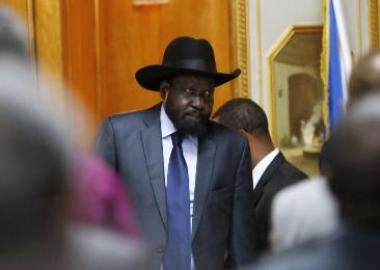S. Sudanese rebel leader decries president Kiir’s remarks on peace agreements
May 29, 2014 (NAIROBI) – South Sudan’s former vice-president and leader of the rebel faction for its ruling party in opposition has criticised president Salva Kiir over his recent remarks following the signing of a roadmap agreement between the two warring parties.

While briefing South Sudanese intellectuals in the Kenyan capital, Nairobi on Tuesday, however, Machar said the statements by president Kiir were inopportune and impacted negatively on the implementation of the roadmap agreement, which demanded immediate cessation of hostilities by the two warring parties.
He accused the South Sudan’s government of violating the 9 May agreement shortly after its signing by attacking territories under the rebels’ control.
“Salva Kiir’s statement was very unfortunate because who in his government will commit to the roadmap agreement if the president said he was forced to sign the document,” Machar told hundreds of intellectuals and supporters of the SPLM/A in Opposition in Nairobi.
The opposition leader said he was not aware of a situation in which the two leaders were threatened or forced by the Ethiopian authorities to sign the agreement, adding he suspected president Kiir used the remarks as an excuse to violate the agreement.
“I was not forced to sign the roadmap agreement,” he added, saying he had frank and constructive discussions with the Ethiopian premier on the drafting of the agreement.
The document, he further clarified, contained agreements on cessation of hostilities and humanitarian access as well as agenda for further negotiations on restructuring of the state and transitional government.
“It was a good compromise paper,” he added, saying the documents would be developed into frameworks.
FOREIGN FORCES MUST WITHDRAW
The rebel leader also renewed his call for withdrawal of the Ugandan People’s Defence Forces (UPDF) and other non-South Sudanese armed groups allied to Kiir’s regime.
He said there are seven different foreign forces or armed groups in South Sudan allied to the government and fight against the rebels.
In his last week’s remarks to the media, president Kiir claimed that his former deputy, Machar, allegedly brought the Ugandan troops into South Sudan. He also accused the former Unity state governor, Taban Deng Gai, who leads the rebel group’s delegation at the Addis Ababa peace talks, of allegedly bringing into South Sudan the Sudanese rebels such as the Justice and Equality Movement (JEM).
Machar, however, dismissed the claims, saying the president’s “mind boggling” remark was an attempt to “evade responsibility.”
He argued as vice president then, he and the Unity state’s governor by then had no authority to bring foreign army or rebel groups into the country without the approval from the government and the president, adding that the president would have raised a motion against them if that was true.
The rebel leader further challenged that it wouldn’t make sense for the UPDF and JEM to ally with president Kiir and fight against his group if he was the one who brought them to South Sudan.
He accused Kiir of allegedly deploying the UPDF forces on 13 December, two days before the violence erupted on 15 December 2013, saying the action suggested that the crisis was premeditated.
The rebel group has recently renewed their demand that the foreign forces withdraw before they could sign a matrix on the cessation of hostilities agreement.
Uganda says it will only withdraw its troops unless a regional force is deployed to South Sudan to replace its army.
Rebels have, however, rejected the deployment of a separate deterrent force by the IGAD regional body, saying it would behave like the UPDF by siding with the government to deter their forces, but said they would accept such a deployment if it will strictly be part of the current United Nations peacekeeping operations in the country.
A total of 2,500 regional force contributed from Ethiopia, Kenya and Rwanda is expected to be deployed to South Sudan by the end of June, but will likely be placed under the command of the United Nations Mission in South Sudan (UNMISS), according to a proposal on a resolution to be adopted by the UN Security Council in New York.
(ST)
